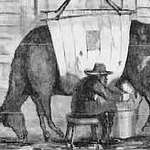Whether served fried, steamed, or boiled, a well-shaped dumpling offers a tasty perfect bite along with a well-intentioned wish for luck, prosperity, and good health. As We Eat is embarking in a three-part series exploring the global cuisine of dumplings, and our first episode starts with a survey of the intersection of food and medicine with a deeper exploration of two immensely popular Pan Asian dumplings - gyoza and siu mai.

Lucky Dumplings
One dumpling tells many stories - its shape mirrors those of precious gold ingots, its ingredients reflect ancient beliefs in the power of food to bring health and wealth to the eater, and its folding showcases the work of many hands making work light. Each dumpling itself is a sort of “perfect bite” showcasing a world of flavor encapsulated within a pillowy cloud of dough.
As we take a three-part journey into the global culinary phenomenon of dumpling, Leigh and Kim share the history and culture behind some of the world’s favorite dumplings to unveil some of the rhyme and reason behind their popularity and prominent place on our plates.
The Good Doctor + Siu Mai
Our first dumpling discovery takes As We Eat to East Asia where dumplings like jiaozi (gyoza) originated as a form of food medicine. Leigh brings us to the stories of Zhang Zhongjiang, a revered Chinese doctor who used food as a way to combat frostbite and other ailments. In gratitude to the doctor for easing suffering, ear-shaped dumplings are presented at feast tables to welcome good health in eaters’ lives.
Across the Pacific Ocean (and several centuries later) Kim reflects on her first time dining in Los Angeles’ Chinatown where she first encounters “The Four Heavenly Kings” - a collection of Chinese staple dishes that form the backbone of dim sum service: siu mai, har gow, char siu bao, and egg tarts. She traces the origins of her favorite siu mai dumpling to teahouses in the Guangzhou Province of southern mainland China. As China’s only port open to foreign trade through the late 18th Century, siu mai variations traveled from across China to the rest of the world - the dumpling can be found throughout the Asian food diaspora, including Japan, Indonesia, the Philippines, Vietnam, and onto the United States and Canada.
Like other foods that we’ve discussed - namely Fish Stews and Chowders - each type of dumpling has inherited variations in ingredients, flavor traditions, and cooking techniques.
Do you have a favorite Asian Dumpling?
Episode Transcript
🎧 Click here for the full, interactive transcript of this episode 🎧
Sources We Found Helpful for this Episode
The origins of siu mai: how an iconic dim sum staple came to be | South China Morning Post
What's a dim sim? How an oversized dumpling became an Australian food icon | CNN Travel
The Oxford Companion to Food, edited by Alan Davidson
Books We Think You’ll Enjoy Reading
Dumplings for Beginners: 50 Recipes and Simple Step-by-Step Lessons to Make Your Favorite Dumplings by Terri Dien
Dumplings All Day Wong: A Cookbook of Asian Delights From a Top Chef by Lee Ann Wong
Gyoza: The Ultimate Dumpling Cookbook: 50 Recipes from Tokyo's Gyoza King - Pot Stickers, Dumplings, Spring Rolls and More! by Paradise Yamamoto
The Dumpling Galaxy Cookbook by Helen You and Max Falkowitz
The Dumpling Sisters Cookbook: Over 100 Favourite Recipes From A Chinese Family Kitchen by The Dumpling Sisters (Author)
Recipes You Really Need to Try
Authentic Pork Shui Mai (Shumai) from Yum China
Episodes We Think You’ll Like
Join us in two weeks for the second installment of our dumpling series. If you’re enjoying the podcast, we would love to have you join our supporting subscribers. For just a few dollars, you can get access to exclusive content, including the Recipe Box Roulette “card game”, more in-depth articles, and recipes. You’ll also help keep our oven lights on!
We would love to connect with you
AsWeEat.com, on Instagram @asweeat, join our new As We Eat community on Facebook, or subscribe to the As We Eat Journal.
Do you have a great idea 💡 for a show topic, a recipe 🥘 that you want to share, or just say “hi”👋🏻? Send us an email at connect@asweeat.com
Review As We Eat on Podchaser or Apple Podcast. We would like to know what you think.
Thank you for listening to the As We Eat Podcast. This post is public so share it with a friend - or three :)























Share this post